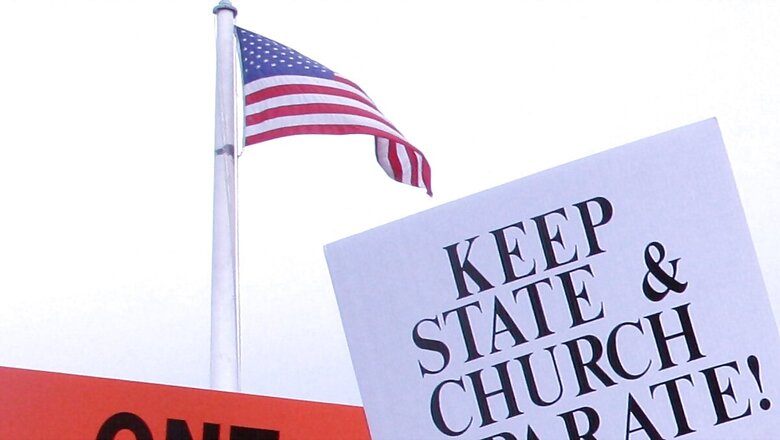
views
When the Indian prime minister goes to the temple, the so-called liberal world goes into a meltdown. It is said democracy and religion do not mix in any other country. It is perhaps time to take a tour of other democracies of the world, and their definition of secularism. Most Indians regard the United States of America as the beacon of secular values. The reality is, the US is the farthest from the proverbial “separation of Church from State”.
Secularism in America
The official motto of the United States is: In God We Trust. This motto comes from the Bible (Psalm 115: 9–11). In God We Trust is written on American currency notes. Many states of the US mandate the display of the motto on public buildings, government institutions, courts, elementary schools, middle and high schools, and all classrooms.
The United States, specifically the Western civilisation, makes no bones about it that it was founded on Judeo-Christian values, a term that stands for religious, ethical beliefs and cultural values regarded as common to both Judaism and Christianity. US Senate (what we call parliament in India) starts with the prayer “O God, through the merits of Jesus Christ, Thy Son, and our Savior”. The prayer is not secular, or inclusive of all world religions.
The US Senate has a chaplain or priest, who has an office, staff, and even a communications team. The chaplain performs ceremonial and pastoral duties. He conducts daily prayers for the members, answers questions from the Bible, and conducts a prayer breakfast for the Senate members. To date, all Senate chaplains have been of Christian religion.
The state funds these initiatives. Since the year 2000, the US has spent over 10 million dollars of taxpayers’ money on Christian prayers. During the pandemic, the US Roman Catholic Church received special exemptions from federal rules and received grants of at least $1.4 billion in taxpayer money and Covid aid. Many allege that much of this money will be used by the Church to settle sexual abuse legal cases. Overall, the Catholic Church received over $3.5 billion, making it one of the biggest beneficiaries of the US government’s pandemic relief grants.
In the 2014 Supreme Court Case, Town of Greece v. Galloway, the court upheld the legality of prayer in all public forums, including the federal government. In a 5-4 decision, the US Supreme Court opined prayers in the Senate are “legal, part of US history, a way to solemnize public affairs”.
Religion is on display in the conduct of the elected heads of state. Every newly elected President of the United States officially seeks blessings from the Pope of the Vatican Catholic Church. The president’s wife goes along, wearing the customary black veil. This has been an unbroken tradition since time immemorial.
Secularism in Britain
British monarchs are officially called ‘Defender of the Faith and Supreme Governor of the Church of England’. They have to be full members of the Church of England, and mandatorily, take the oath to maintain the Church during their coronation. The coronation of the British Head of Parliament is a 100 per cent religious ceremony. The Church of England appoints 26 bishops to the British Parliament. They are called ‘Lords Spiritual’ who sit in the House of Lords in the UK, conduct daily prayers, give opinions on important matters, and have full voting rights. The bishops are paid up to 27,000 pounds for attending parliament.
In 2023, a new bill was introduced in the British Parliament, called the Disestablishment of the Church of England, to formally separate the state from the Church of England. The bill has not been passed yet.
Secularism in Australia
Traditionally in Australian politics, the Labor Party was primarily composed of Catholic Christians, and Liberals were supported by the Protestant Christians. Since 1982, the Australian Parliament has had the Parliamentary Christian Fellowship Trust with the mission to promote Christianity in Parliament. It is recognised as a forum for national leaders to come together to pray for our nation, national issues, and Christian values.
Australia’s churches were granted millions of dollars in JobKeeper payments, as part of Covid programs in 2020. Australian tax records show that 3,500 Christian organisations received $627 million in 2020.
If I move the gaze to Europe’s entanglement of State and church, it will generate matter worthy of an entire book, running into hundreds of pages.
What is Bharatiya Secularism?
The above comparison, merits the question – Does any of this happen in India? The answer is an emphatic no!
Unlike Britain, the Indian Parliament is not the defender of any faith. Unlike the US, the elected head of the Indian state is not obliged to visit any religious leader to seek blessings. Unlike the US and Britain, there are no chaplains, bishops, or priests officially paid for by using the taxpayer’s money.
But educated Indians are Macaulay’s children. We have been fed the wrong definition of secularism. Our colonisers gave us their definition of secularism and democracy. We have been benchmarking ourselves against these definitions that come from Western civilisation, founded on Judea-Christian values.
Centuries of colonisation have led us to the mindset that the ‘West is the best’. We have forgotten that Bharatvarsha rests on Sanatana Dharma values. Dharma and righteousness have always been part of Bharat’s governance. It is the job of the king or ruler, to ensure that everyone follows ‘dharma’ while doing their duty. Each individual is empowered to follow their ‘swadharma’, including their own ‘samaanya and vishesh dharma’, making this philosophy inherently ‘panthnirpeksha’.
Sanatana Dharma is intrinsically secular, making Bharat secular, largely because the vast majority of Hindus are Sanatani and hence inherently secular.
Anu Lall is the founder of YogaSmith, author and entrepreneur. She is a lawyer and has worked in the pharmaceutical and technology industry in Asia, USA, and Europe. Views expressed in the above piece are personal and solely those of the author. They do not necessarily reflect News18’s views.




















Comments
0 comment